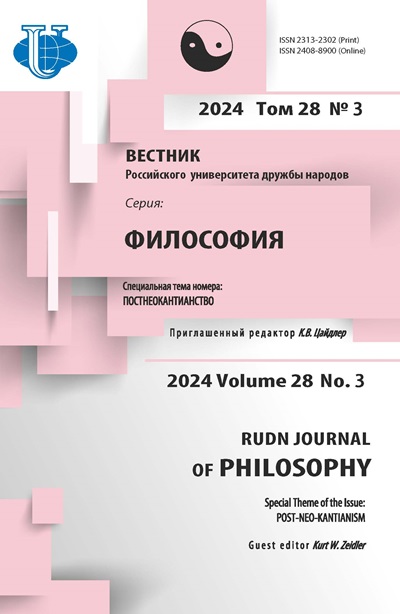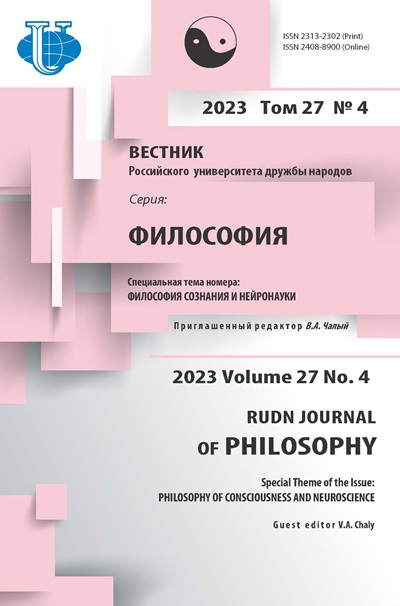Philosophical and Methodological Problems of Modern Neurotheology
- Authors: Lagunov A.A.1, Ivanova S.Y.1
-
Affiliations:
- North Caucasian Federal University
- Issue: Vol 27, No 4 (2023): PHILOSOPHY OF CONSCIOUSNESS AND NEUROSCIENCE
- Pages: 915-927
- Section: PHILOSOPHY OF CONSCIOUSNESS AND NEUROSCIENCE
- URL: https://journals.rudn.ru/philosophy/article/view/37144
- DOI: https://doi.org/10.22363/2313-2302-2023-27-4-915-927
- EDN: https://elibrary.ru/TMFJOI
Cite item
Full Text
Abstract
In modern science, research aimed at studying the functioning of the human brain under the influence of various factors of the social and natural environment, including religious practices, both personal and social, is relevant. The purpose of the research is to consider the current state of neurotheology as a new field of knowledge and to analyze the possibilities of its interaction with already existing social and humanitarian disciplines; review, analytical and critical publications of Russian and foreign scientists are used as material for the study. Attention is drawn to the philosophical and methodological problems that neurotheology needs to be resolved in order to determine its place in the modern cognitive space as its organic component. First of all, according to the authors of the article, representatives of this science need to enrich the formed empirical basis with theoretical generalizations, for which it is necessary to implement the principle of interdisciplinarity declared by them and involve specialists from various fields of humanities in the common work. In the hypotheses put forward by neurotheologists, the question of the ontological existence of objects of religious experience is recognized as epistemologically insoluble, however, when constructing a philosophical and worldview concept, it is impossible to limit oneself to such statements; It is noted that the idea developed in neurotheology about the genetic translation of the qualities of the “brain/consciousness” in the process of “cognitive evolution” of mankind returns us to the social deterministic and mechanistic views overcome by modern science. The hope is expressed that neurotheology, having overcome the emerging philosophical and methodological difficulties, will play an important role in the development of Russian science.
About the authors
Aleksey A. Lagunov
North Caucasian Federal University
Author for correspondence.
Email: emaillag@mail.ru
ORCID iD: 0000-0002-8498-6449
DSc in Philosophy, Professor, Professor of the Department of Philosophy and Ethnology, Humanitarian Institute
1 Pushkina St., 355000, Stavropol, Russian FederationSvetlana Yu. Ivanova
North Caucasian Federal University
Email: isu-socf@yandex.ru
ORCID iD: 0000-0003-2375-6348
Doctor of Philosophy, Professor, Head of the Department of Philosophy and Ethnology, Humanitarian Institute
1 Pushkina St., 355000, Stavropol, Russian FederationReferences
- Ashbrook JB. Neurotheology: The Working Brain and the Work of Theology. Zygon. 1984;19:331—350. https://doi.org/10.1111/j.1467-9744.1984.tb00934.x
- Miheev V. Can feelings and ideas be religious and secular? Criticism of the modern psychology of religion. State, religion, church in Russia and abroad. 2018;(3):142—167. (In Russian). https://doi.org/10.22394/2073-7203-2018-36-3-142-167
- Bazhanov VA. Neurotheology: religion in the focus of modern cultural neuroscience. Religious Studies. 2018;(1):118—125. (In Russian). https://doi.org/10.22250/2072-8662.2018.1.118-125
- Borisova OA., Kopejko GI., Malevich TV. Neurobiological approach to the study of religious and mystical experiences. Psychiatry. 2015;(1):39—43. (In Russian).
- Malevich TV. Neurotheology: theories of religion and the science of the brain. Religious studies. 2013;(1–2):62–83. (In Russian).
- Cahes I. Neuroscience and religious experience: on the way to building an integrative model. Religious studies. 2013;(1–2):51—61. (In Russian).
- Descartes R. Rules for guiding the mind. In: Doubt everything: with comments and explanations. Moscow: AST publ.; 2019. P. 18—148. (In Russian).
- Mamardashvili MK. Cartesian reflections. Moscow: Progress, Kul'tura publ.; 1993. (In Russian).
- Descartes R. Pervonachala filosofii. In: Doubt everything: with comments and explanations. Moscow: AST publ.; 2019. P. 149—315. (In Russian).
- Berdjaev NA. On the appointment of a person. Moscow: AST publ.; 2006. (In Russian).
- Frank SL. Reality and man. Metaphysics of human existence. In: Essays: God is with us. Moscow: AST publ.; 2003. P. 133—436. (In Russian).
- Zijai AA. How theology understands neurotheology. Social and Humanitarian Sciences. Domestic and foreign literature. Series 3, Philosophy. Abstract journal. 2017;(2):79—87. (In Russian).
- Borisov OS, Eremeev SG. Cultural codes and virtual reality. Pushkin Leningrad State University Journal. 2020;(1):77—87. (In Russian).
- Lopatin LM. Criticism of empirical principles of morality. In: Articles on ethics. Saint Petersburg: Nauka publ.; 2004. P. 56—112. (In Russian).
- Kedrov BM. Conversations about dialectics. Six-day philosophical reflections during the journey. Moscow: KomKniga publ.; 2007. (In Russian).
















